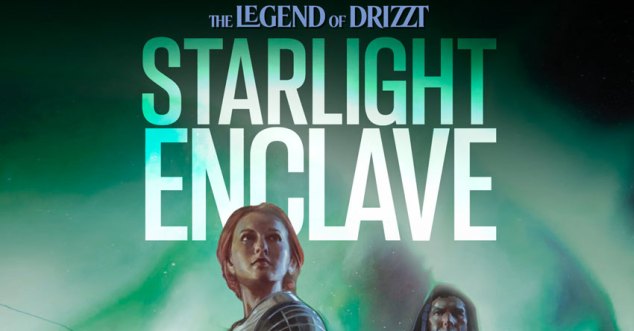Every month, the League of Utah Writers hosts a Speaker Series that engages established writers to speak and share their experience, advice, wisdom, and funny stories. The Series is only for league members so you are encouraged to join The League of Utah Writers to take advantage of these opportunities (when permission is given, the sessions are also recorded). Spoiler alert, you don’t actually need to be a Utah resident to participate! The League has active chapter members across the States.
This July, the Speaker Series had a second guest appearance. R.A. Salvatore joined the League for a special Q&A session in anticipation of his new novel, Starlight Enclave, which continues Drizzt’s story. Salvatore also shared that he really enjoyed writing this book because he was able to develop a new culture and that sounds really exciting for readers too.

The conversation spanned several different topics, but the theme that shone brightest is that R.A Salvatore is a rulebreaker.
Hearing Salvatore say if he had pursued his master’s degree in English he wouldn’t be writing the books he wanted to write resounded with me. “I think you can be overtrained in some things,” he said. The writing world today looks so different than when Salvatore entered it in the mid 1980s. Writers just now trying to shape their careers are encouraged to get degrees in writing, shell out for various writing experiences ranging from classes, workshops, or retreats, and subscribe to services advertising well-known writers who will teach new writers how to be like them. Even though self publishing is no longer the domain of folks with trust funds, some circles still tout this idea that only they have the secret to potential success—for the right price.
Salvatore repeated multiple times that he wrote what he wanted to read, encouraging the audience to write what they want to read, is a breath of fresh air for the struggling and financially precarious and/or unstable writers of today.
But before Salvatore got to that point where he wasn’t pursuing his master’s degree, he told the story of how he was in an advanced class learning about Chaucer and his Canterbury Tales. The age-old question of why the parson was at the back of the line came up. Two students offered very thoughtful reasons why, and the teacher said they were wrong. By this time, Salvatore had already written a couple books, had worked with various editors, and was familiar with both writing as a creative outlet and a business. Salvatore challenged the teacher by asking, “How do you know they’re wrong?” The teacher could only provide him what she thought was a single, right answer that Salvatore couldn’t accept as he kept asking, “How do you know?” That question got him thrown out of class, and he ended up quitting. “If I have to start looking at books like that instead [. . .] of an experience the reader has with the written word, I wasn’t going to be able to do what I wanted to do.”
This theme of doing what he wants threads many of Salvatore’s writing decisions. Using his history as a boxer, playing hockey, and watching sports, Salvatore writes compelling, beautiful battle scenes in his novels when that simply wasn’t done when he started reading and writing fantasy. The other concept that Salvatore did was change point of view.
This was quite a shocking decision. One of the many rules new writers are told is to avoid changing point of view. Yet Salvatore decided to do it, even though it wasn’t supposed to be done, because it was what he wanted to do, because it was a tool in his toolbox that could allow him to write these grand battle scenes in a way he couldn’t do otherwise. Shifting points of views allows his readers to connect to all his characters, even the minor ones.
Salvatore said, “Most of the rules that you learn in writing were written for people who were writing [. . .] before television, let alone the internet, and TikTok and all the rest of it.” This statement blew my mind, forcing myself to reframe how I thought about my own craft. “My audience,” Salvatore continued, “grew up with television, and all television is is a point of view shift.”
There are two other cardinal rules of writing that Salvatore ignores. The first is avoiding adverbs, and the second is avoiding attributing dialogue. Millennials, Gen Z, and the younger generation are growing up with a wide variety of platforms that include both of these writing styles. “Emojis are adverbs,” Salvatore said. Ignoring the way the current generation reads and consumes media will cause writers to lose some of their audience and will make their stories less accessible.
One of the many other things that Salvatore doesn’t believe in is writer’s block, which he describes as a “lack of confidence.” This sentiment isn’t meant to foster arrogance, but rather choosing that vulnerability, even if you don’t know what you’re doing: “Sit down, shut up, and type.”
The freedom to write what you enjoy reading cannot be overstated. Worrying about writing to market or worrying about writing what other people love can bog writers down in pits of self doubt that can and will kill dreams. As Salvatore said in closing, “The journey is more important than the goal.”
I hope you take the time to read Salvatore’s new book, Starlight Enclave, which will be released August 3rd. A great big thanks to R.A. Salvatore for the time he shared with the League of Utah Writers.